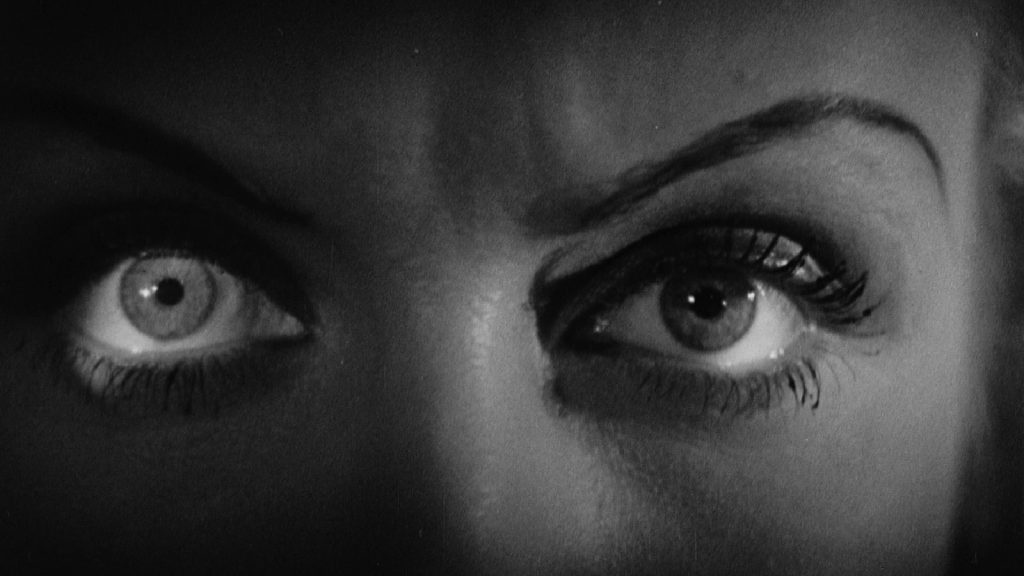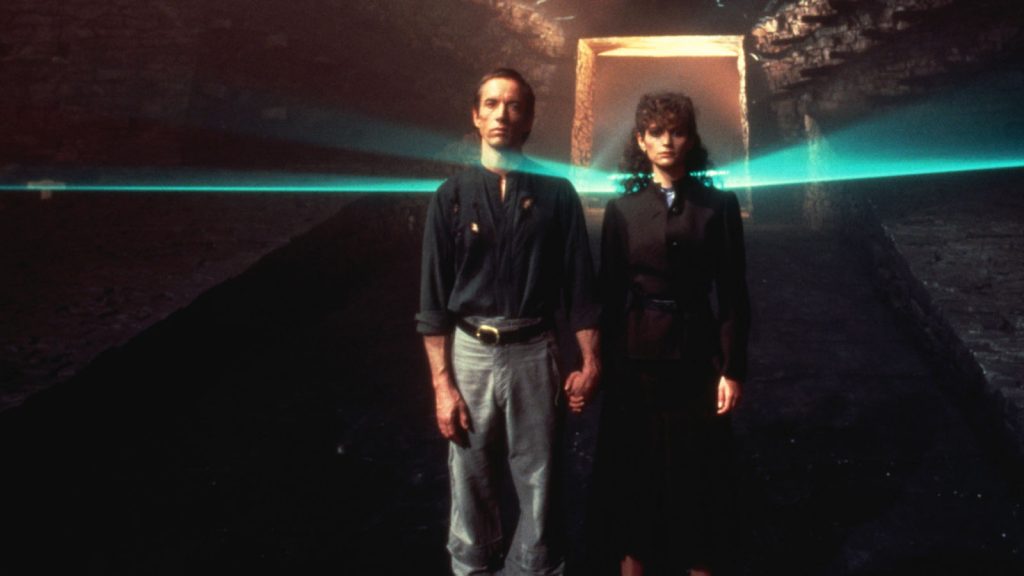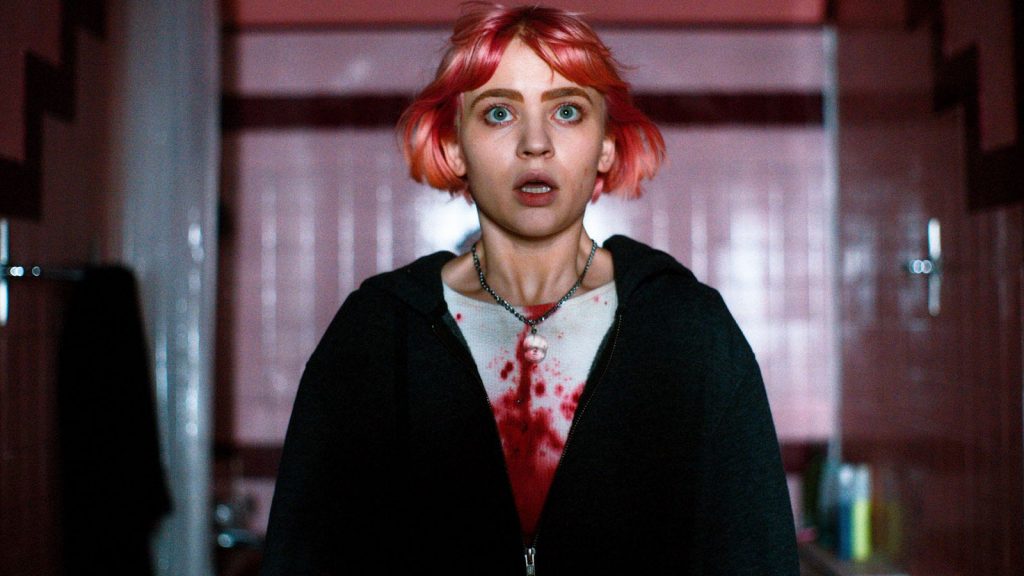
The year was 1838, when the entire world was permanently overcast, underlit, and draped in smoke, and everyone was unhappy and utterly humorless. Somewhere in Germany, porcelain-skinned Ellen (Lily-Rose Depp) marries Thomas (Nicholas Hoult), an eager young real-estate lackey who wishes he had more money. Thomas’s boss (Simon McBurney) takes advantage of his employee’s desperate financial situation, sending the lad to the Carpathian Alps to seal a deal with Count Orlok (Bill Skarsgård), an eccentric shut-in suffering from severe respiratory issues and arthritis so bad it’s transformed his fingers into shriveled turmeric. The journey is riddled with bad omens: a stranger laughs maniacally at Thomas for no discernable reason, he is refused lodgings for merely mentioning his client’s name, and his horse is stolen, leaving him to undertake the frigid final ascent to Orlok’s castle on foot. Upon reaching his destination, things only get worse. Ornery Orlok, who does all business after dark, appears to have ghosts for staff and their cooking is shit. What’s more, it’s not long before Orlok gets fresh with Thomas, chomping into his chest and shamelessly sucking his blood. Meanwhile, back home, Ellen seems to divine everything that’s happening between Thomas and Orlok in distant Transylvania, perhaps because she’s committed, in her way, to both men: we already learned during the bleakly erotic prologue that some years ago Ellen promised Orlok eternal companionship before collapsing into spasms and miming what sure looks like a hand job directed toward her mouth. Soon enough, both of her fellas will come back to her, but only one of them is Satan—or at least one of Satan’s pals, it’s really unclear—bringing with him the bubonic plague and many, many rats.

No doubt all this sounds terribly familiar. Drawing upon F.W. Murnau’s Nosferatu (1922), Werner Herzog’s Nosferatu the Vampyr (1979), other Nosferatus, and many, many cinematic iterations of Bram Stoker’s Dracula, this new Nosferatu from writer/director Robert Eggers has the distinction of being at once lavish, superfluous, and boring. Despite the fecund metaphors of its source material, this is a film devoid of poetry. I know it sounds cute to call a movie about a revenant lifeless, but seriously, this Nosferatu is all pictures and no motion: momentum was never Eggers’s strong suit, but here his penchant for inert aesthetics has finally resulted in the triumph of storyboard over story. He makes a stodgy three-course meal of every reheated plot point. As one might expect from Eggers, the film is awash in visual references, from Caspar David Friedrich to Häxan to The Phantom Carriage, but the arduous fetishization of old-timey effects that characterized the most beguiling moments in The Lighthouse is, in the generously budgeted Nosferatu, interrupted by the blandest of modern genre tropes, such as roller-coaster crane shots and roaming extreme close-ups. Though Willem Dafoe, who once played Max Schreck playing Nosferatu, tries to inject some fun into the proceedings as the verbose Professor Albin Eberhart von Franz, there are no actual characters in this film, only figures posing within the overwrought mise-en-scène. Aided by Robin Carolan’s strangled score, Eggers crams so much artificial tension into every scene that all stakes dissolve in a sea of histrionics.
Aside from being flamboyantly drab, only two elements imbue this rendition of Nosferatu with any significant distinction: firstly, Eggers reading of the text seems to emphasize the idea that the story is ultimately about the return of an oppressive, older ex-boyfriend, and secondly, harkening back to the facial hairstyle of Vlad the Impaler, who was among the inspirations for Stoker’s novel, Eggers has given us the curious advent of a vampire with a flavor saver. Though perfectly handsome in his off-screen life, Skarsgård, who played Pennywise in It and It Chapter Two, makes an astonishingly unattractive antagonist, that droopy, unkempt, blood- and gore-caked mustache being but one of his sartorial deficits. It seems weirdly stingy of Eggers to deny us a sexy, or even just non-disgusting, prince of darkness. Truly, Bela Lugosi is dead.

is a freelance critic and playwright.
Now that the fear economy is booming, you may be kicking yourself for investing everything in love. But before you dump all those stocks, ask yourself the perennial...
BY TOM PHELAN | November 12, 2024
If ever a film’s reputation preceded it, Victor Sjöström’s The Phantom Carriage is that film. On more than one occasion, Charlie Chaplin called it the best motion picture ever made...
BY STEVEN MEARS | October 18, 2024
There is a particular allure to the silent horror movie—the sense that, as a viewer, you haven’t merely stumbled upon something but perhaps you’ve unearthed it.
BY MICHAEL KORESKY | November 30, 2023

This pre-Code offering packs a lot of story into its typically brisk running time, with several plot threads weaving together a (not always successful) tapestry of spooky and criminal doings.
READ MORE >
BY ANN OLSSON | Month 00, 2021

In what could be the fastest-resulting rape revenge movie, a drunken lout brutally forces himself on Ida, the young woman who doesn't return his affections, during a party over Labor Day.
READ MORE >
BY LAURA KERN | Month 00, 2021

Beast is a lot of movies in one package - fractured fairy tale, belated-coming-of-age story, psychological drama, regional horror film - but above all it's a calling card for its leading lady, Jessie Buckley.
READ MORE >
BY LAURA KERN | Month 00, 2021